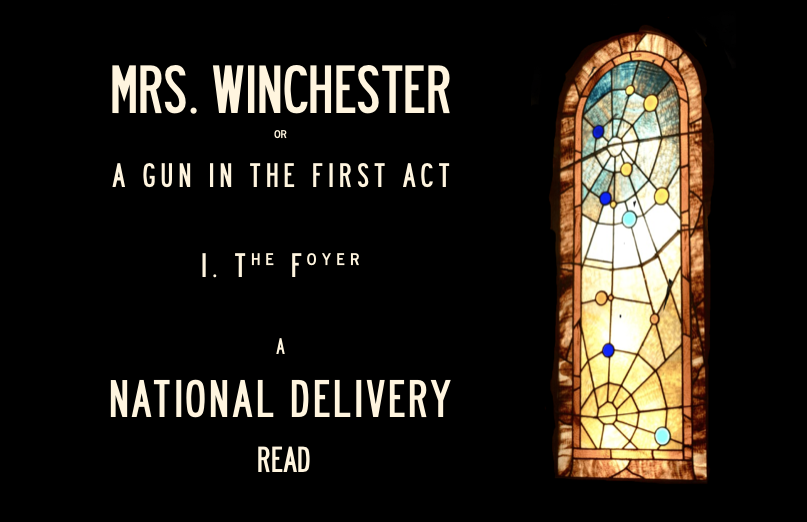Mrs. Winchester I. The Foyer

Why?
Why would the sole resident of a perfectly accommodating California farmhouse transform it into a sprawling, seven-story mansion of six-hundred rooms, forty stairways, at least as many fireplaces, three elevators, thousands of windows, two ballrooms, and a séance parlor?
Why?
This is the question I most often am asked, and the one, tonight, I may answer.
Welcome. I am Sarah Winchester, and this is my house. It was expanded in 1886… and 1887… and 1888, 1889, all through the nineties, and will continue to expand, most every day and around the clock, until I expire.
I do not call it home. Home is New Haven, Connecticut, where I lived as a girl, as a wife, as a mother. In practice, I am no longer any of those things. My family went to their graves in swift succession, and when I lie with them in our native soil, I will again be home.
Here in San Jose, I am simply a widow with a house. A conspicuous house. A house that stirs wonder and rumor. When you lose everything of value and gain a fortune, strange things may rise.
My father-in-law, Oliver Winchester, founded the Winchester Repeating Arms Company. If you’ve not been shot dead by one of its products, you’ve likely heard of it. Oliver and his son William, my husband, died within months of each other, and at the age of forty-two, I inherited a burden of twenty-million dollars and half possession of the company, which pays me two thousand dollars… per day.
You might think me most fortunate. And of course, I am. But without Oliver and William, and without my parents, and without the daughter William and I lost after she’d struggled through forty days of life, I was alone. Alone where I had never known loneliness. If solitude were my lot, I would practice it elsewhere. A place of vast open space and scouring light.
California.
Unlike most western pioneers, I had my fortune; I just needed a place to sleep.
When I saw the farmhouse, my reaction was, “It’s not big enough”.
“How big must it be?” asked Gonzalo, the groundskeeper.
“Bigger. Big enough to contain my grief”.
I was embarrassed by the admission, and thenceforth presented architectural designs without explanation. Which vexed everyone. But me.
This evening, you will find me less guarded. I have paused construction on Llanada Villa for the duration of this informal tour, which may or may not dispel the whisperings you may have heard. I find it an absolute delight to hear legends spread about me, especially from those who do not realize next to whom they are standing. To these unsuspecting gossips, I have contributed a savory tidbit or two myself.
Legends are useful. If I may say so at the outset and still retain your trust, legends are often truer than the truth.
But not always.
That acknowledged, we begin where we stand - the foyer - originally a fifth of it’s present size. After the sale of the property was final, I spent a week, mostly in this room, reluctant to enter the house, weeping. I wept a lot in those days. One afternoon, exhausted with sorrow, I went to Gonzalo’s toolshed, took a sledgehammer, came back into this room, and knocked a hole in the wall.
I didn’t stop at one.
Gonzalo ran into the house. “Señora! What are you doing?”
“I am not sure, Mister Gallegos, but it feels marvelous”.
The demolition was a catharsis. But the reflection, revision, and reconstruction that followed was a revival - of purpose, if not spirit.
Thus began a habit that has seen me through all these years: when come the fantods, knock out a wall.
As Gonzalo and I cleared out the debris that day, I noticed a spiderweb in the doorway that hadn’t been disturbed by the commotion. It’s maker was present, as she had been a week earlier when I first noticed the intricacy. In its bottom right corner, she hung perfectly still, as if in gratified contemplation of her work.
“Thank you, friend,” I said to the creature.
Then I went to discuss a sudden idea for window patterns with Mr. Gallegos.
NEXT: The Hearth
From Mrs. Winchester, or, A Gun in the First Act by Joe Christiano